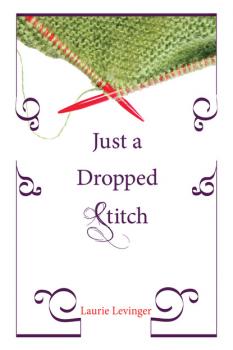ТОП просматриваемых книг сайта:
Laurie E. Levinger
Список книг автора Laurie E. LevingerАннотация
Just a Dropped Stitch is a memoir told in interlocking short stories. It's a family photo album; each snapshot tells a mini-story. You're sure you understand what you're seeing, but it's not until you've finished flipping through the entire album that you develop an intimate sense of who this family is. You thought you knew them, understood all the subtleties and dynamics, but, change the angle, soften the focus, flip the page; there's a different story.
Jesse, the narrator, is on a search. She's trying to identify the «dropped stitches» in her own life, to name them, and reknit them into a whole.
As the book opens Jesse's mother is dying, but Jesse and her father find it impossible to face the inevitable. Turn the page: Jesse desperately wants to have children; she's a lesbian; she has to figure out how to make that happen. Later we meet her children, Noah and Sophie; we're introduced to Anna, who becomes Jesse's spouse, before the world has caught up with the concept. We meet grandparents, and learn that in Jesse's family writing is revered, but infused with unspoken taboos. And we meet her brothers who each has a particular place to stand in the family portrait.
Jesse has a story to tell, and she isn't sure it's safe to tell it. Loss and grief, being silenced and silencing oneself, becoming frozen, and the heat-generating, melting power of love, these are the themes in Just a Dropped Stitch. The importance of naming, the redemption that comes from breaking silences, these are the interwoven threads.
Meanwhile, keep flipping through the album and you see snapshots of everyday life: hiking with Noah, shopping with Sophie for a bat mitzvah dress. And Jesse's mother, who refuses to completely disappear, makes a surprise appearance, embarrassing Jesse at a job interview. As we close the album, we're keeping vigil with Jesse in the hospital while she waits to hear whether she has the disease that killed her mother. And, then, there's a final snapshot: a handmade Chinese box, with sides that drop open, revealing a blood-red interior where there's nothing to hide.
Jesse, the narrator, is on a search. She's trying to identify the «dropped stitches» in her own life, to name them, and reknit them into a whole.
As the book opens Jesse's mother is dying, but Jesse and her father find it impossible to face the inevitable. Turn the page: Jesse desperately wants to have children; she's a lesbian; she has to figure out how to make that happen. Later we meet her children, Noah and Sophie; we're introduced to Anna, who becomes Jesse's spouse, before the world has caught up with the concept. We meet grandparents, and learn that in Jesse's family writing is revered, but infused with unspoken taboos. And we meet her brothers who each has a particular place to stand in the family portrait.
Jesse has a story to tell, and she isn't sure it's safe to tell it. Loss and grief, being silenced and silencing oneself, becoming frozen, and the heat-generating, melting power of love, these are the themes in Just a Dropped Stitch. The importance of naming, the redemption that comes from breaking silences, these are the interwoven threads.
Meanwhile, keep flipping through the album and you see snapshots of everyday life: hiking with Noah, shopping with Sophie for a bat mitzvah dress. And Jesse's mother, who refuses to completely disappear, makes a surprise appearance, embarrassing Jesse at a job interview. As we close the album, we're keeping vigil with Jesse in the hospital while she waits to hear whether she has the disease that killed her mother. And, then, there's a final snapshot: a handmade Chinese box, with sides that drop open, revealing a blood-red interior where there's nothing to hide.
Информация о книге
Автор произведения Laurie E. Levinger
Жанр Контркультура
Серия Emerald City Books
Аннотация
Love and Revolutionary Greetings: An Ohio Boy in the Spanish Civil War is the story of Sam Levinger, a young man who went to Spain in 1937 to join the Abraham Lincoln Brigade. Civil war raged in Spain as the fascist army of Francisco Franco sought to overthrow the democratically elected Republic. Levinger, a dedicated idealist, made the commitment to go to a foreign country to fight fascism. Love and Revolutionary Greetings is placed in the historical context of the 1930s, when freedom everywhere was threatened by Franco, Hitler, and Mussolini. The book is based on Sam Levinger's letters, poems, and stories that he sent home from Spain, interspersed with those of his mother, Elma Levinger. Told in the words of a soldier son and his mother, as well as other members of the Abraham Lincoln Brigade, the book offers an eyewitness account of the hardships and the politics of the times. Men and women from all over the world went to Spain to fight with the International Brigade to defend Spanish democracy. Twenty-eight hundred men and women from the United States joined the International Brigade. Sam Levinger was one of them. Sam died in Spain when he was twenty years old. The author, Sam Levinger's niece, traveled to Spain to search for his unmarked grave. Love and Revolutionary Greetings tells the emotional and political story of American involvement in the Spanish Civil War in the language of people who lived it.


